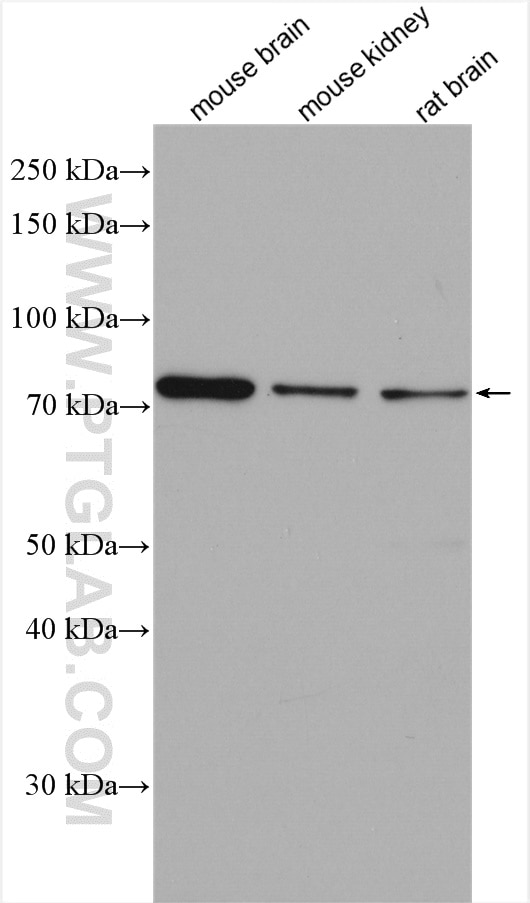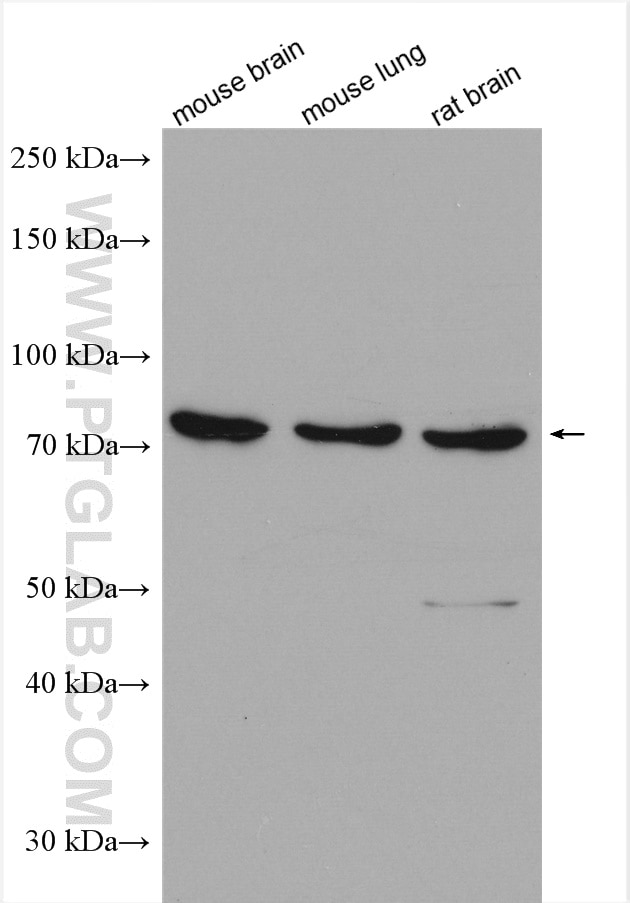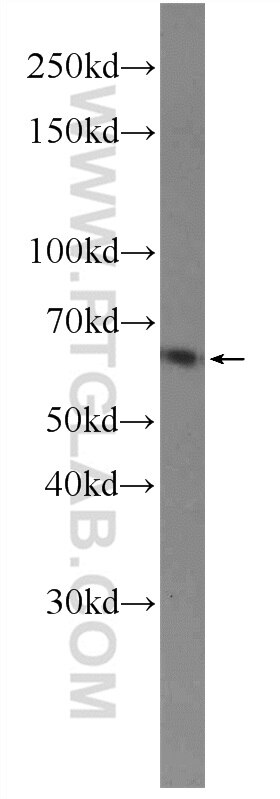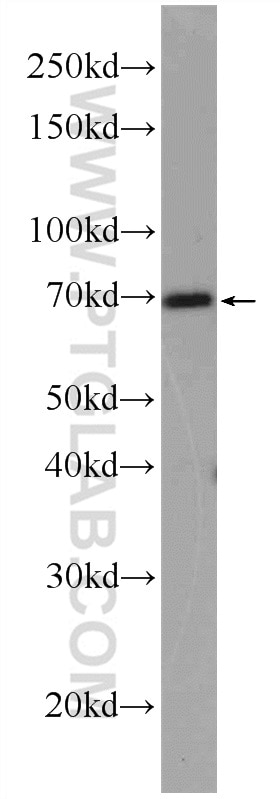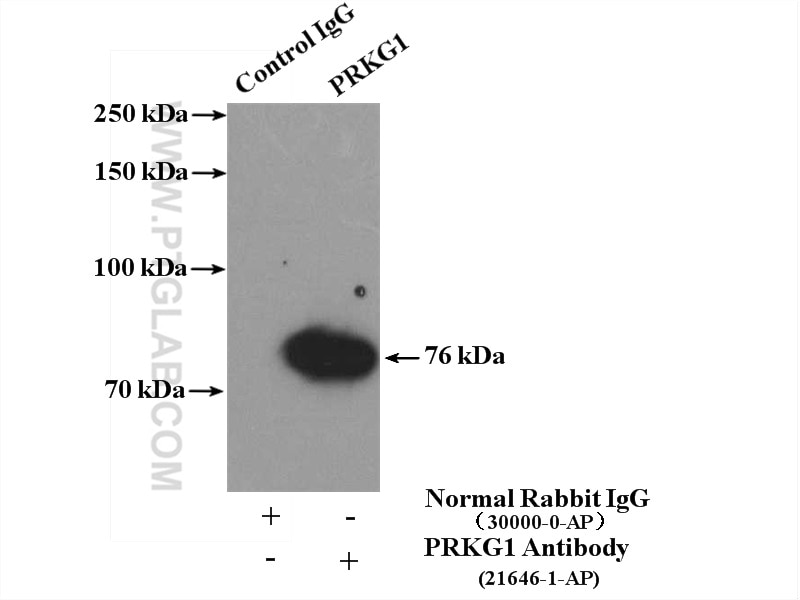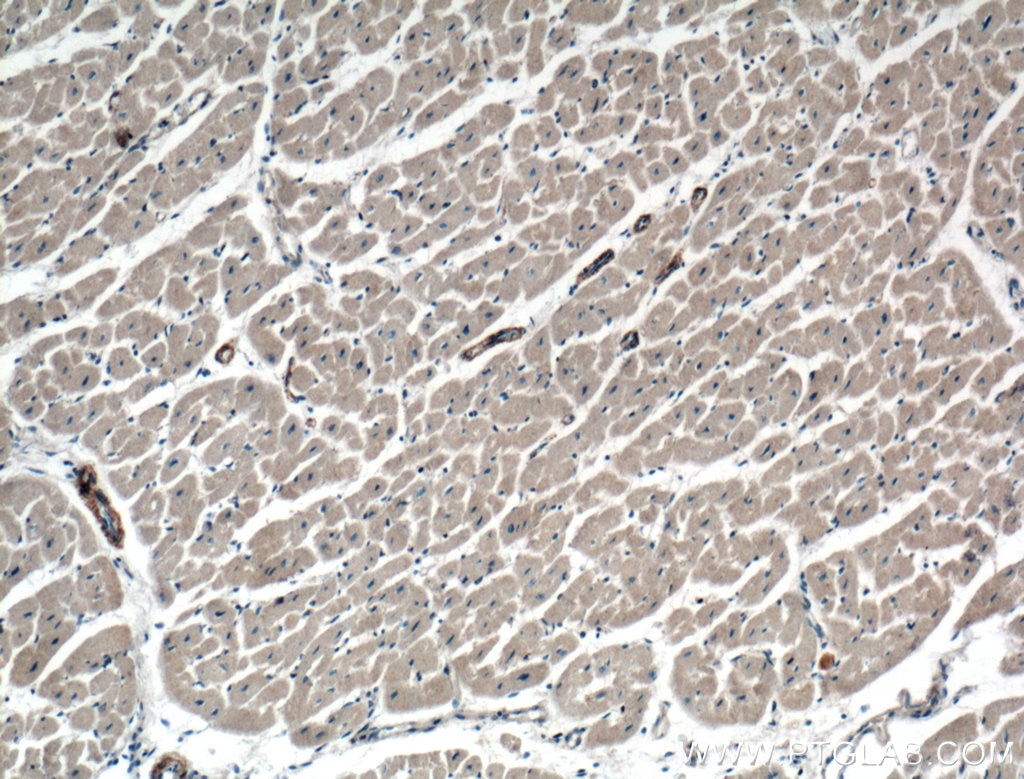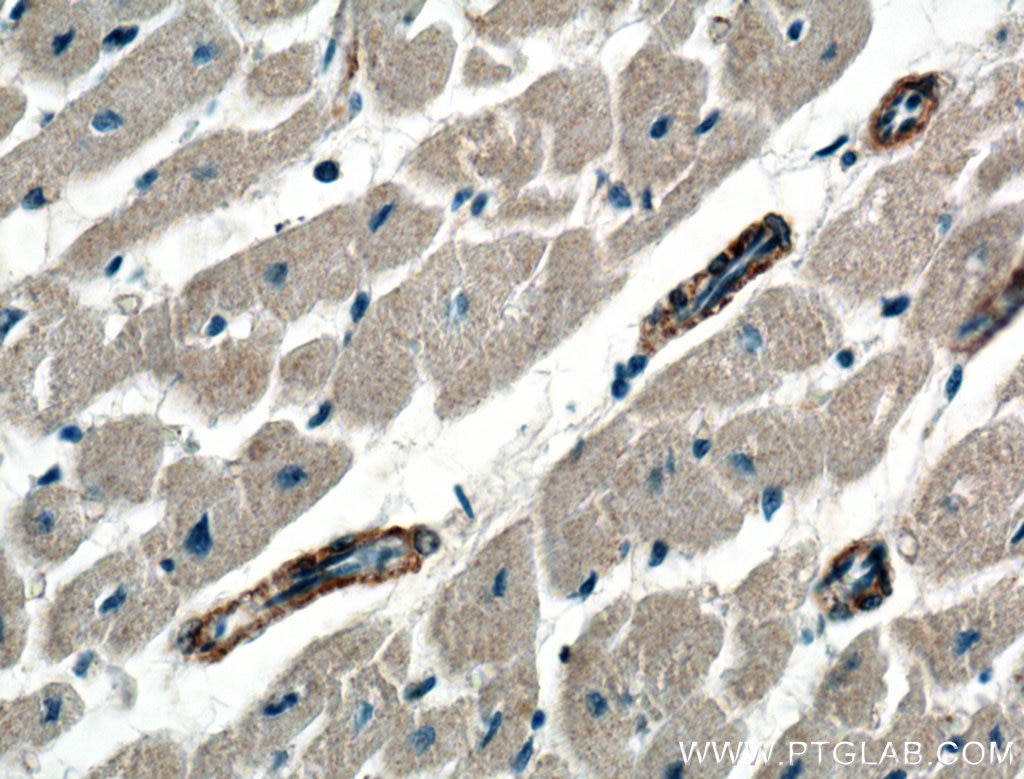- Phare
- Validé par KD/KO
Anticorps Polyclonal de lapin anti-PRKG1
PRKG1 Polyclonal Antibody for WB, IP, IHC, ELISA
Hôte / Isotype
Lapin / IgG
Réactivité testée
Humain, rat, souris et plus (1)
Applications
WB, IP, IHC, ELISA
Conjugaison
Non conjugué
N° de cat : 21646-1-AP
Synonymes
Galerie de données de validation
Applications testées
| Résultats positifs en WB | tissu cérébral de souris, tissu cérébral de rat, tissu pulmonaire de souris, tissu rénal de souris |
| Résultats positifs en IP | tissu cérébral de souris |
| Résultats positifs en IHC | tissu cardiaque humain, il est suggéré de démasquer l'antigène avec un tampon de TE buffer pH 9.0; (*) À défaut, 'le démasquage de l'antigène peut être 'effectué avec un tampon citrate pH 6,0. |
Dilution recommandée
| Application | Dilution |
|---|---|
| Western Blot (WB) | WB : 1:1000-1:3000 |
| Immunoprécipitation (IP) | IP : 0.5-4.0 ug for 1.0-3.0 mg of total protein lysate |
| Immunohistochimie (IHC) | IHC : 1:50-1:500 |
| It is recommended that this reagent should be titrated in each testing system to obtain optimal results. | |
| Sample-dependent, check data in validation data gallery | |
Applications publiées
| KD/KO | See 1 publications below |
| WB | See 16 publications below |
| IHC | See 2 publications below |
Informations sur le produit
21646-1-AP cible PRKG1 dans les applications de WB, IP, IHC, ELISA et montre une réactivité avec des échantillons Humain, rat, souris
| Réactivité | Humain, rat, souris |
| Réactivité citée | rat, bovin, Humain, souris |
| Hôte / Isotype | Lapin / IgG |
| Clonalité | Polyclonal |
| Type | Anticorps |
| Immunogène | PRKG1 Protéine recombinante Ag16333 |
| Nom complet | protein kinase, cGMP-dependent, type I |
| Masse moléculaire calculée | 686 aa, 78 kDa |
| Poids moléculaire observé | 65-78 kDa |
| Numéro d’acquisition GenBank | BC127090 |
| Symbole du gène | PRKG1 |
| Identification du gène (NCBI) | 5592 |
| Conjugaison | Non conjugué |
| Forme | Liquide |
| Méthode de purification | Purification par affinité contre l'antigène |
| Tampon de stockage | PBS avec azoture de sodium à 0,02 % et glycérol à 50 % pH 7,3 |
| Conditions de stockage | Stocker à -20°C. Stable pendant un an après l'expédition. L'aliquotage n'est pas nécessaire pour le stockage à -20oC Les 20ul contiennent 0,1% de BSA. |
Informations générales
PRKG1(cGMP-dependent protein kinase 1) is also named as cGK1, PRKG1B, PRKGR1A, PRKGR1B and belongs to the cGMP subfamily. It serves as an integral component of second messenger signaling in a number of biological contexts including cell differentiation, memory, and vasodilation(PMID:21893290). Its activity prevents pathological-level nitric oxide-induced apoptosis and promotes DNA synthesis/cell proliferation in vascular smooth muscle cells(PMID:20060325). PRKG1 has 2 isoforms produced by alternative splicing with the molecular weight of 76 kDa and 78 kDa. The autophosphorylation can increase the kinase activity and it can form a monomer with the molecular weight of 65 kDa that is produced by proteolytic cleavage. SDS-PAGE revealed that proteolysis generated two different monomers with molecular masses of 70 and 68 kDa of CGK1-beta(PMID:8702828).
Protocole
| Product Specific Protocols | |
|---|---|
| WB protocol for PRKG1 antibody 21646-1-AP | Download protocol |
| IHC protocol for PRKG1 antibody 21646-1-AP | Download protocol |
| IP protocol for PRKG1 antibody 21646-1-AP | Download protocol |
| Standard Protocols | |
|---|---|
| Click here to view our Standard Protocols |
Publications
| Species | Application | Title |
|---|---|---|
Environ Pollut Fluoride-induced unrestored arrest during haploid period of spermatogenesis via the regulation of DDX25 in rats. | ||
Clin Sci (Lond) Empagliflozin prevents cardiomyopathy via sGC-cGMP-PKG pathway in type 2 diabetes mice. | ||
Front Cell Dev Biol Myostatin Mutation Promotes Glycolysis by Increasing Phosphorylation of Phosphofructokinase via Activation of PDE5A-cGMP-PKG in Cattle Heart.
| ||
Front Pharmacol Emodin Interferes With Nitroglycerin-Induced Migraine in Rats Through CGMP-PKG Pathway. | ||
Cancer Cell Int NEK7 promotes gastric cancer progression as a cell proliferation regulator. | ||
Eur J Pharmacol A novel phosphodiesterase 9A inhibitor LW33 protects against ischemic stroke through the cGMP/PKG/CREB pathway. |
